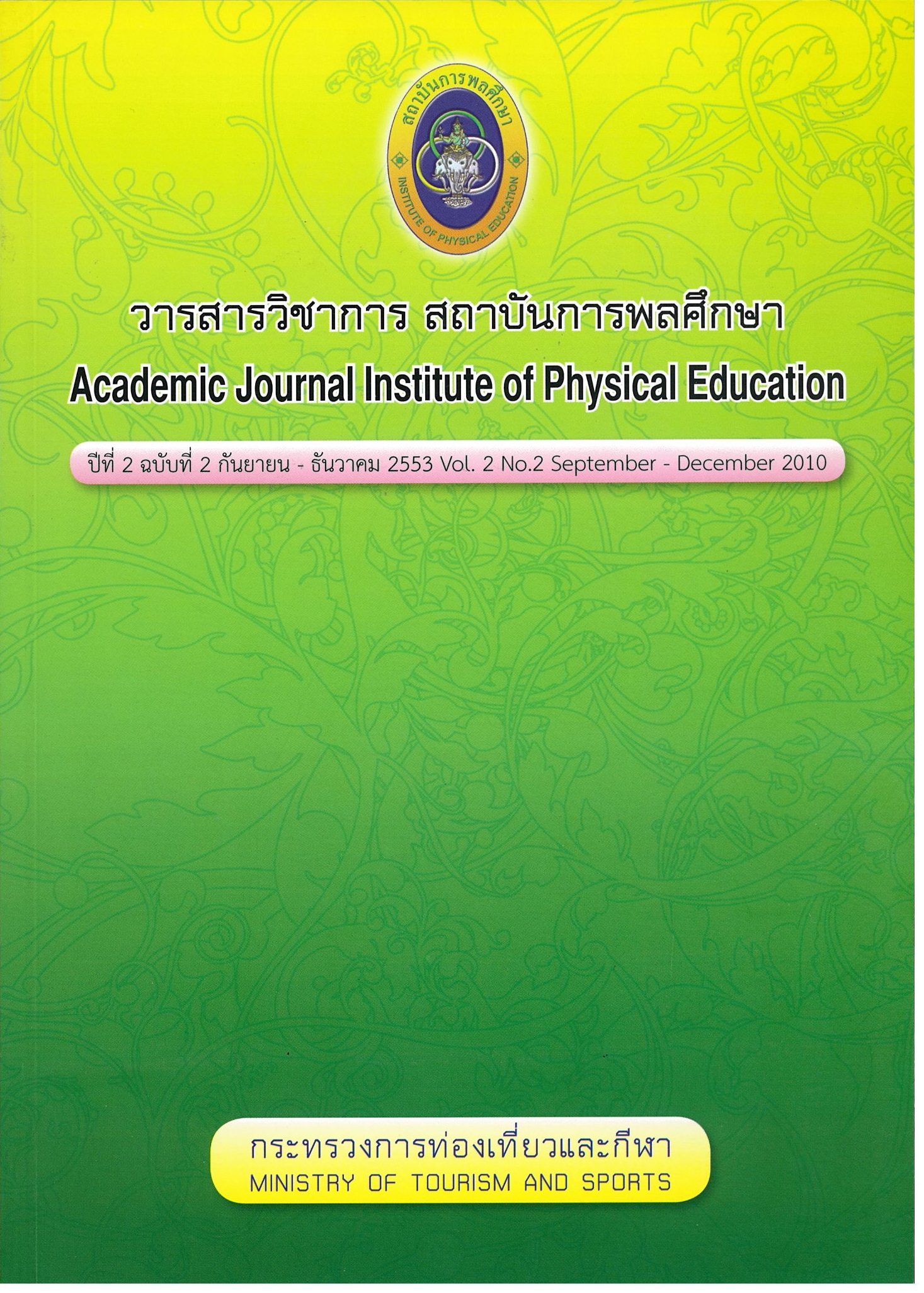A STUDY OF ETHICAL BEHAVIORS OF INSTITUTE OF PHYSICAL EDUCATION
Main Article Content
Abstract
The porpose of this research were to study the ethical behavior of Institute of Physical Education Students in terms of self-discipline, integrity, responsibility, sacrifice,
self-reliance, and diligence. It also aimed to compare the ethical behavior of IPE Students classified by variables, gender, faculty, and learning achievement. 375 IPE Students, who were studying in the academic year of 2009 at Phetchabun Campus, Mahasarakham Campus, Chumphon Campus, and Samut Sakhon Campus, were the sample size of this research. The Rating Scale questionnaire was asked in this research. For data analysis, percentage, Mean, standard deviation, t-test, and One-Way Analysis of Variance (One-Way ANOVA) were utilized
The results of this study show that: 1) Overall and individual ethical behavior of IPE students was in the high level. 2) There was no significant difference in overall and individual ethical behavior between male and female students of the statistic. 3) There was no significant difference on an overall result among the IPE students who were studying in the Faculty of Education, Faculty of Sports and Health Science, Faculty of Liberal Arts. When considering each part, the specific ethical behavior in the respects of self-reliance of IPE Students in the Faculty of Sports and Health Science and Faculty of Liberal Arts were found statistically different at the .05 level. In terms of diligence, there was a significant difference of the statistic at the .05 level between the IPE students in the Faculty of Sports and Health Science and Facultyof Liberal Arts. While there was no significant difference on self-discipline, integrity, responsibility, and sacrifice. 4) Overall and individual ethical behavior of IPE students with the high, medium, and low levels of learning achievement was not significantly different.
Article Details
The published article is a copyright of the Academic Journal of Thailand National Sports University. The passage appeared in each article in this academic journal is a perspective of each author which is not related to the journal. Each author is required to be responsible for all components of his/her own article. If there are any mistakes, each author must be responsible for those mistakes on his/her own.
References
จารุรัตน์ มังกะโท้ย. (2544). การศึกษาพฤติกรรมเชิงจริยธรรมของนักเรียนระดับประกาศนียบัตรวิชาชีพวิทยาลัยอาชีวศึกษากาญจนบุรี สังกัดกองวิทยาลัยอาชีวศึกษา กรมอาชีวศึกษา กระทรวงศึกษาธิการวิทยานิพนธ์ศึกษาศาสตร์ มหาบัณฑิต, มหาวิทยาลัยรามคําแหง.
ดวงเดือน พันธุมนาวิน. (2524). พฤติกรรมศาสตร์เล่ม 2 จิตวิทยาและจิตวิทยาภาษา, กรุงเทพมหานคร : ไทยวัฒนาพานิช.
นวลละออ แสงสุข (2544), การศึกษาพฤติกรรมเชิงจริยธรรมของนักเรียนชั้นมัธยมศึกษาตอนต้น โรงเรียนสาธิตมหาวิทยาลัยรามคําแหง, กรุงเทพมหานคร : มหาวิทยาลัยรามคําแหง.
นิตยา ทา. (2548), การศึกษาพฤติกรรมเชิงจริยธรรมของนักเรียนมหาวิทยาลัยรามคําแหง วิทยานิพนธ์ศึกษาศาสตร์ มหาบัณฑิต มหาวิทยาลัยรามคําแหง.
พลศึกษา, สถาบัน. (2548). หลักสูตรสถาบันการพลศึกษา กรุงเทพฯ : องค์การรับส่งสินค้าและพัสดุภัณฑ์.
ภาวิดา ธาราศรีสุทธิ์. (2547). ภาวะผู้นําและจริยธรรมสําหรับผู้บริหารการศึกษา. กรุงเทพมหานคร : มหาวิทยาลัยรามคําแหง.
สํานักงานคณะกรรมการการศึกษาแห่งชาติ. (2547). พระราชบัญญัติการศึกษาแห่งชาติ (ฉบับที่ 1-2) พ.ศ. 2542-2545 ปรับปรุง 2547-2549, กรุงเทพมหานคร : สูตรไพศาล.
สํานักงานคณะกรรมการพัฒนาการเศรษฐกิจและสังคมแห่งชาติ. (2550). แผนพัฒนาเศรษฐกิจและสังคมแห่งชาติ ฉบับที่ 10 (พ.ศ.2550-2554). กรุงเทพมหานคร : สํานักงานคณะกรรมการพัฒนาการเศรษฐกิจและสังคมแห่งชาติ.
สุโขทัยธรรมมาธิราช, มหาวิทยาลัย (2550), เอกสารการสอนชุดวิชาจริยศึกษา, กรุงเทพฯ: มหาวิทยาลัยสุโขทัยธรรมาธิราช 2550

